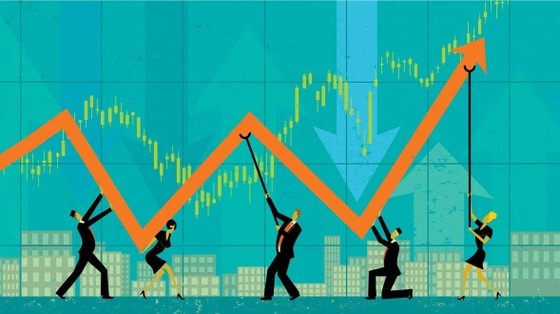 |
| Illustrative photo |
Economic growth is now facing many challenges and the pace is not accelerating as expected. This viewpoint was expressed by Mr. Nguyen Minh Cuong, Chief Economist of the Asian Development Bank (ADB) in Vietnam.
JOURNALIST: - Sir, in your opinion, will adverse external influences hinder Vietnam's economic growth?
Mr. Nguyen Minh Cuong: - This is but natural. Though first of all, the structure of Vietnam's economy is revealing many inadequacies. For instance, the synchronous coordination of both vertical and horizontal sectors, such as between ministries and branches, does not have much consensus. This is reflected in the slow disbursement of public investment capital compared to expectations. Although the Government has been very quick to speed up the disbursement of public investment capital in recent years, it cannot be resolved overnight.
Then there is the problem of capital markets. In fact, Vietnam's capital market has not yet fully synchronized with the money markets. The economy still relies heavily on bank credit, so credit in the whole economy is showing signs of growing even bigger. Meanwhile, other capital mobilization channels such as bonds and securities are in the process of development and need more time to consolidate.
Finally, there is the labor market. It can be seen very clearly that in the context of consumer demand reducing all over the world, thousands of Vietnamese workers were immediately affected and were laid off. This has revealed another dark side which is the issue of social security, especially the group of workers in the informal sector which is not yet protected. The consequences of this problem we have seen in 2021 when the Covid-19 pandemic broke out and tens of thousands, even hundreds of thousands of workers returned back to their hometowns. This created great pressure in ensuring jobs and social security for these workers and at the same time making it difficult for businesses to recruit enough workers to maintain and expand production when the economy was ready to make recovery.
- Sir, what scenario do you predict for Vietnam's economy in 2023? What preparations are needed to cope with the situation?
- External factors strongly affected the Vietnamese economy in 2022, and these may extend throughout 2023. Therefore, Vietnam's economic prospects in 2023 are still quite dependent on the development of the world economic situation. But I think that in the second quarter of 2023, global inflation will show signs of cooling down. Inflation is expected to be under control by the spring of 2023, and there is little chance of the world economy falling into recession. At the same time, in 2023 China will gradually reopen again and create a two-way trade between Vietnam and China. These are all positive factors that we hope to see in 2023.
However, for the economy to recover and grow sustainably, Vietnam needs to immediately solve several internal bottlenecks. In the immediate future, it is necessary to create favorable conditions for enterprises to develop well so that the economy can make stable recovery. To do this, Vietnam needs to open up capital flow, especially bank credit for priority sectors. At the same time, the capital market also needs to reopen the capital flow of the corporate bonds market and at all costs promote public investment.
I think that Vietnam must use stronger measures to accelerate the disbursement of public investment capital, with smooth coordination between the central and local governments, and between ministries and other related sectors. Finally, Vietnam needs to strengthen social security measures. The decline in consumer demand is only local. Export recovery will happen, but not very quickly. Therefore, the implementation of good social security solutions will act as a vaccine that will limit the negative external impact of factors that may occur during 2023.
- Sir, what do you think about the VND350,000 billion support package of the Government?
- The Government support package of VND350,000 billion includes four main groups, namely, infrastructure development, fiscal, monetary, and social security. Among these four groups, the policies on fiscal, tax exemption, and tax reduction will bring the best results. In particular, the 2 percent VAT reduction has had a positive impact on the business community. In contrast, the remaining three groups have not yet had much clear impact.
First is a monetary policy through the 2 percent interest rate support package and calling on commercial banks to actively reduce loan interest to support businesses. Since the beginning of the third quarter, the State Bank of Vietnam has adjusted the operating interest rate twice and raised the deposit interest rate twice also. Bringing loan interest to a lower level is unlikely now. Due to policies related to social security, many people have not yet accessed this support package.
Meanwhile, one-third of the support package, equivalent to VND114,000 billion, is for infrastructure development and perhaps the least effective, because Vietnam's administrative procedures are very lengthy and take a long time to process. It takes about two years to complete a project portfolio. Then it takes another two to three years for the project to be approved. This is besides other procedures such as the core investment plan, which takes a few more years to complete. On the other hand, the support package requires disbursement in only two years between 2022 to 2023.
Therefore, it can be seen that the support package related to infrastructure development is the least satisfactory. This group should be included in public investment while disbursing in this way will be the most efficient method.
- Thank you very much.
























